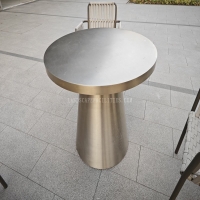Welcome to the website for landscape facilities products and knowledge.
How do landscape bar counters accommodate the needs of professional event planners versus DIY homeowners?
For professional event planners, landscape bar counters represent a critical infrastructure component designed for high-volume service, efficient workflow, and customizable branding opportunities. These specialists require durable surfaces that withstand commercial use, integrated refrigeration for beverage storage, strategic lighting for evening events, and flexible layouts that accommodate bartending staff and serving logistics. The professional specification often includes weather-resistant materials like stainless steel or commercial-grade polymer composites, with considerations for drainage, power access for blenders and point-of-sale systems, and compliance with hospitality industry standards.
Conversely, DIY homeowners approach landscape bar counters as multifunctional entertainment hubs for casual gatherings rather than commercial events. Their priorities center on aesthetic integration with existing backyard designs, ease of maintenance, and budget-friendly materials like stained wood or prefabricated concrete kits. Homeowners typically seek features that enhance personal enjoyment—built-in seating, planters for herb gardens, pizza ovens, or DIY kegerator installations—rather than operational efficiency. The focus remains on creating intimate social spaces rather than optimizing for rapid service turnover.
The fundamental divergence lies in scalability and precision. Event professionals require bars that support simultaneous drink preparation for hundreds of guests, with considerations for barback accessibility and compliance with health codes. DIY installations prioritize personalization and aesthetic harmony with residential landscapes, often incorporating decorative stonework, pergolas, or fire pits adjacent to the bar area. Both applications benefit from modular designs that allow for future expansion, but where professionals prioritize functional redundancy—dual ice wells or backup power connections—homeowners value decorative elements like mosaic tiles or custom lighting.
Material selection further distinguishes these applications. Professionals specify non-porous, sanitization-ready surfaces that resist stains and abrasion, while homeowners might choose natural stone or wood for rustic appeal despite higher maintenance needs. Similarly, storage solutions differ: commercial designs emphasize secure liquor storage and easy ice access, whereas residential versions incorporate shelving for glassware and personal accessories.
Ultimately, landscape bar counters serve as a testament to adaptable design meeting distinct user profiles. Manufacturers now offer hybrid solutions—residential bars with commercial-grade surfaces or modular systems that scale from intimate gatherings to large events—acknowledging the blurred line between professional and home entertainment needs in modern outdoor living spaces.
Related search:

Recommendation
Outdoor Metal Table - Classic Outdoor Furniture, Stainless Steel Table, Durable and Reliable